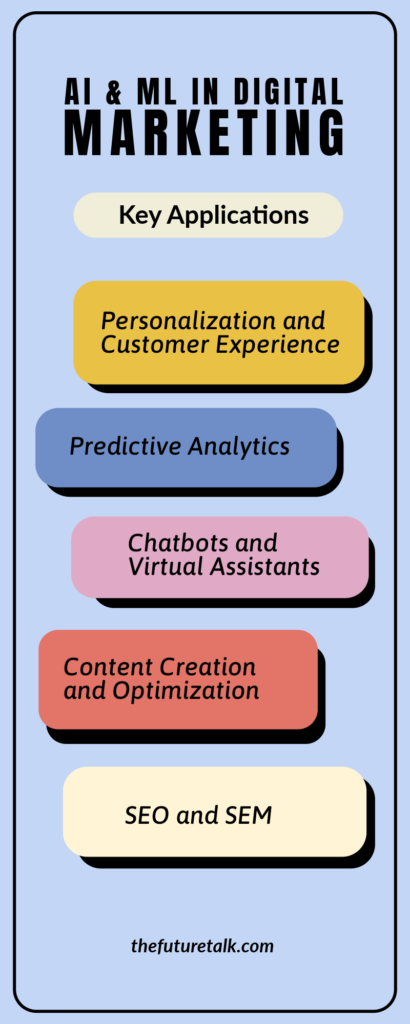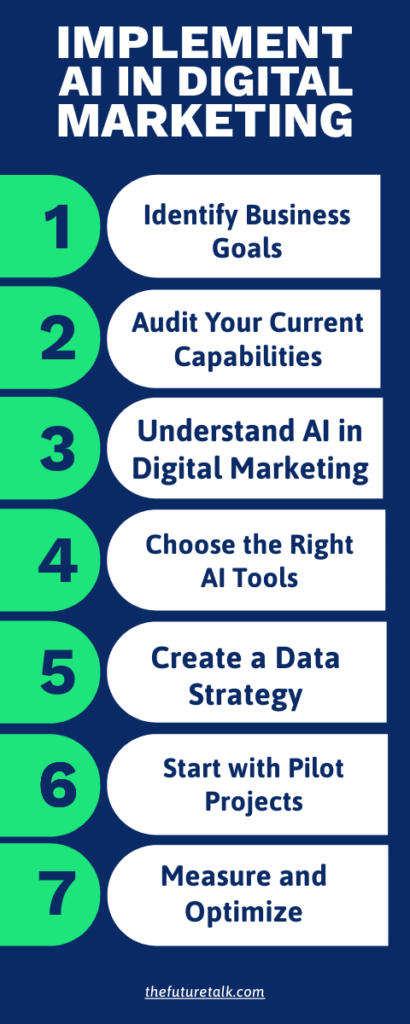
Every business, in today’s fast-paced digital world, is constantly seeking innovative ways to stay ahead of the competition. Marketers are attempting everything possible to connect with their target audience, implementing digital marketing strategies. But what if I tell you there is something more innovative approach that marketers can apply to their marketing strategies?
Enter Artificial Intelligence (AI) and Machine Learning (ML). Let us think about a marketing assistant who never gets tired, never sleeps, learns from every campaign, analyzes marketing trends and patterns, and continuously improves your strategies. Yes, that is true and that is the power of AI and ML in digital marketing.
So, how do these technologies show their magic in digital marketing? How do AI and ML help businesses in their digital marketing strategies? And how can these technologies work for you as your superheroes? Don’t worry, we got you covered.
Also Read: Maximizing ROI: The Role of Analytics in Digital Marketing Campaigns
The Influence of AI-ML in Digital Marketing
The advent of AI and ML has brought about significant transformation in the digital marketing landscape. These technologies have empowered businesses in how they interact with consumers, optimize campaigns, and measure success.
According to a survey by Salesforce, the adoption of AI among marketers has grown by 44% since 2017. It shows that 29% of marketing organizations are already using AI while 46% have plans to use it within two years.
The report further reveals where AI is being used by marketers. The top areas include:
- Personalizing the overall customer journey
- Automating customer interactions over social channels or messaging apps
- Leveraging online data to facilitate offline experiences
- Generating dynamic landing pages and websites
- Programmatic advertising and media buying
- Delivering predictive journeys
How AI and ML Work in Digital Marketing?
AI and ML in digital marketing have introduced innovative tools and techniques that enhance customer engagement, optimize campaigns and predict future market trends. Let’s look at the key applications of these technologies in the fast-evolving field of digital marketing.

Personalization and Customer Experience
By assessing large amounts of data from various sources, AI and ML enable digital marketers to create personalized experiences for customers. For example, video streaming platforms like Netflix and e-commerce giants like Amazon use AI algorithms to create suggestions for movies, shows, and products based on users’ past interactions.
Predictive Analytics
By analyzing customers’ historical data, AI and ML provide marketers with predictive analysis to forecast future customer actions. For instance, a retailer can envisage which products a customer is likely to buy by evaluating his or her past purchase data and online behavior. Based on the data, they can offer personalized promotions.
Chatbots and Virtual Assistants
With AI-powered chatbots and virtual assistants, businesses can provide instant, automated customer support. These assistants significantly enhance user experience while freeing up professionals for more complex tasks. Many e-commerce websites use chatbots to resolve customers’ queries, guide them through the purchasing process, and provide after-sales support.
Content Creation and Optimization
AI tools like ChatGPT and Jasper can help marketers create content, including blog posts, social media campaigns, and email newsletters, based on predefined parameters and data inputs. AI and ML algorithms can also examine which types of content perform best and optimize future content accordingly.
SEO and SEM
By analyzing search patterns, identifying relevant keywords, and suggesting enhancements, AI-powered tools like SEMrush and Ahrefs enable marketers to optimize their websites for search engines. These tools are also beneficial in bidding strategies for search engine marketing (SEM) campaigns.
How To Integrate AI in Your Digital Marketing Strategy?
There are a lot of benefits AI has to offer ranging from improving decision-making to optimizing marketing campaigns. However, implementing an AI strategy in digital marketing requires a systematic approach that must ensure it meets your business goals while making the most out of this technology.
Here is a step-by-step guide to effectively integrate AI into your digital marketing strategy.

Identify Your Business Goals
Understand your business objectives before aligning AI into your digital marketing strategy. Define what you aim to achieve with your digital marketing efforts. Some of the common goals include increasing customer engagement, automating repetitive tasks, improving lead generation and conversion rates, and optimizing marketing spend.
Audit Your Current Capabilities
Evaluating your existing digital marketing capabilities and infrastructure will help you integrate AI into your next digital marketing strategy. You should determine the data you have and how to leverage it for AI. Key areas to assess include data quality and quantity, technical infrastructure, and team expertise.
Understand the Basics of AI in Digital Marketing
Before going deeper into AI implementation, it is crucial to understand the fundamentals of AI and its benefits in the context of digital marketing. Key AI technologies include machine learning, Natural Language Processing (NLP) predictive analytics, and computer vision.
Choose the Right AI Tools and Technologies
Now it is time to choose and integrate the right AI tools for your digital marketing efforts. Tools like HubSpot and Salesforce Einstein can help you create detailed customer segments. Platforms like IBM Watson can be used to improve customer support. AI-powered tools like ChatGPT, Gemini and Jasper help in generating personalized content.
Create a Data Strategy
As AI relies heavily on data, make a comprehensive data strategy. It should include the source of data collection such as web analytics. Leverage data management platforms to organize and store data efficiently. Ensure data integration and data privacy to secure customer information.
Start with Pilot Projects
To test AI applications for your digital marketing efforts, always begin with small-scale pilot projects before a full-scale implementation. This approach will allow you to assess the effectiveness of AI tools, identify potential challenges and address them early, and gain insights and refine your strategy.
Measure and Optimize
Continuous measurement of the performance of your AI initiatives is crucial. The key performance indicators (KPIs) include conversion rates, customer engagement metrics, ROI, and customer satisfaction scores.
The Bottom Line
AI and ML are revolutionary technologies that empower marketers to create personalized, data-driven, and effective digital marketing strategies. These technologies help businesses gain in-depth insights into their audience, automate tasks, and create compelling content.
As AI and ML continue to evolve, we marketers will explore the exciting benefits of these technologies redefining the future of digital marketing.
Stay tuned to The Future Talk for more such interesting topics. Comment your thoughts and join the conversation.